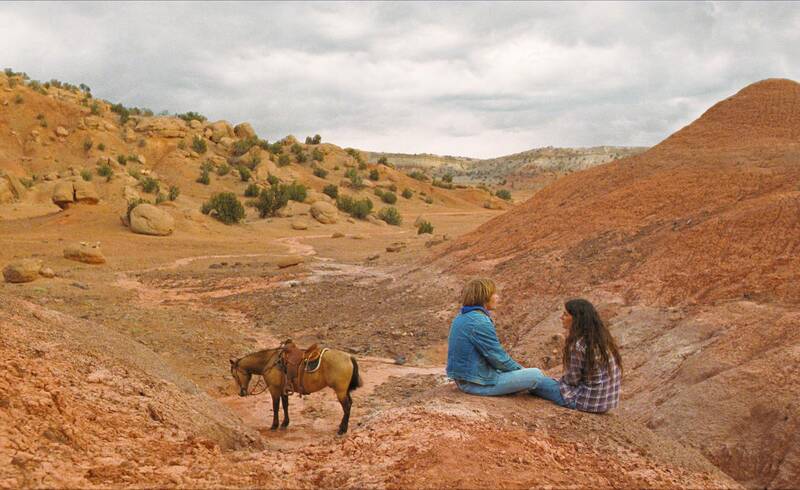If Barbie (and Cormac McCarthy) taught us anything, it’s that few symbols herald straight hypermasculinity quite like horses do.
Perhaps that’s why queer cowboy stories have endured in Hollywood — one way to make a love story interesting after all is by making it subversive or forbidden.
Luke Gilford’s National Anthem sits within that tradition of films. But it also doesn’t.

Photo: AP
It’s true that 21-year-old Dylan (a phenomenal Charlie Plummer) has not been raised in an environment that celebrates or is even open to his sexuality. As a poor construction worker in the American Southwest and father figure to his younger brother, Dylan mostly stays quiet and keeps his head down when his mother (Robyn Lively) and co-workers scoff in disgust or make jokes about him being gay.
Although National Anthem is indeed a story about star-crossed lovers, it is also, more importantly, a coming-of-age exploration of what it means for a person to find community and a place to belong. It also poignantly asks how much autonomy we have in that pursuit.
In it, Dylan is pressured by his mom to take on more work in order to support their cash-strapped family. He happens to find it at a ranch unlike anything he’s ever seen — a queer community of rodeo performers living together in what seems like an idyllic oasis free from the repressive constraints of the outside world.

Photo: AP
Almost nothing is said about each person’s sexuality or gender identity — it doesn’t need to be in a place like this, where fluidity and a rejection of norms is assumed.
Dylan, perhaps for the first time, begins to consider what his own gender performance could look like if he were not inhibited by society’s expectations.
The young construction worker is captivated by everyone’s strong sense of identity and the camaraderie that exists within the nameless group. He almost immediately sparks a romance with the enigmatic and free-spirited Sky (Eve Lindley), but their relationship is complicated by Sky’s existing open partnership with Pepe, the group’s leader.
Cinematographer Katelin Arizmendi artfully cultivates a sense of wonder and awe at the landscape that’s almost its own character in the story. She also gives the film an inkling of surrealism, which heightens Dylan’s dreamlike stupor as he is swept up in this intoxicating romance.
When Dylan goes to his first rodeo with the group, a montage of majestic scenes that scream America — reminiscent of a Budweiser commercial — floods his gaze. But peppered in with the shots of bulls, horses and rugged landscapes are sights of queer romance, pride flags and drag queens touching up their makeup.
Although he finds a newfound freedom and acceptance here, the strain on his relationship with Sky forces Dylan to grapple with where he belongs — is it within the community or with his younger brother and struggling alcoholic mother?
Dylan’s family backstory is frustratingly under-developed, often relied on as a crutch to show that his life is difficult but never expounded upon or resolved in a satisfactory way. His absent father is referenced throughout, but it is unclear what impact, if any, this absence was meant to have had on him.
Gilford, the son of a rodeo rider from Colorado, has a deep personal connection to his feature directorial debut. He had for much of his life an ambivalent relationship to his cowboy roots — until he found the International Gay Rodeo Association.
As both a participant and a researcher who conducted interviews and took photographs, Gilford observed that this was a way for members of the LGBTQ+ community to reclaim the idea of patriotism in a place where they traditionally are not welcome. National Anthem, Gilford’s 2020 book of photography of the same name, documents scenes from these queer rodeos.
More than anything, Gilford’s film ought to be lauded for the way it continues telling a story about a subculture that few know exist.

June 23 to June 29 After capturing the walled city of Hsinchu on June 22, 1895, the Japanese hoped to quickly push south and seize control of Taiwan’s entire west coast — but their advance was stalled for more than a month. Not only did local Hakka fighters continue to cause them headaches, resistance forces even attempted to retake the city three times. “We had planned to occupy Anping (Tainan) and Takao (Kaohsiung) as soon as possible, but ever since we took Hsinchu, nearby bandits proclaiming to be ‘righteous people’ (義民) have been destroying train tracks and electrical cables, and gathering in villages

Dr. Y. Tony Yang, Associate Dean of Health Policy and Population Science at George Washington University, argued last week in a piece for the Taipei Times about former president Ma Ying-jeou (馬英九) leading a student delegation to the People’s Republic of China (PRC) that, “The real question is not whether Ma’s visit helps or hurts Taiwan — it is why Taiwan lacks a sophisticated, multi-track approach to one of the most complex geopolitical relationships in the world” (“Ma’s Visit, DPP’s Blind Spot,” June 18, page 8). Yang contends that the Democratic Progressive Party (DPP) has a blind spot: “By treating any

This year will go down in the history books. Taiwan faces enormous turmoil and uncertainty in the coming months. Which political parties are in a good position to handle big changes? All of the main parties are beset with challenges. Taking stock, this column examined the Taiwan People’s Party (TPP) (“Huang Kuo-chang’s choking the life out of the TPP,” May 28, page 12), the Democratic Progressive Party (DPP) (“Challenges amid choppy waters for the DPP,” June 14, page 12) and the Chinese Nationalist Party (KMT) (“KMT struggles to seize opportunities as ‘interesting times’ loom,” June 20, page 11). Times like these can

Swooping low over the banks of a Nile River tributary, an aid flight run by retired American military officers released a stream of food-stuffed sacks over a town emptied by fighting in South Sudan, a country wracked by conflict. Last week’s air drop was the latest in a controversial development — private contracting firms led by former US intelligence officers and military veterans delivering aid to some of the world’s deadliest conflict zones, in operations organized with governments that are combatants in the conflicts. The moves are roiling the global aid community, which warns of a more militarized, politicized and profit-seeking trend